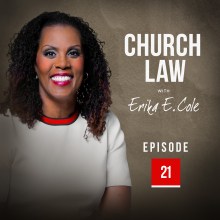Available on:
The past few years have brought numerous challenges to churches, particularly as the COVID-19 pandemic altered weekly attendance and in-person events.
Those alterations affected giving levels, creating stress on some church budgets. And now, even with signs the pandemic is slowing heading into 2023, inflation has jumped, creating only more turbulence.
These conditions have left many congregations reassessing their directions and priorities as they look for ways to move forward.
In this episode, Erika is joined by Mike Poirier, senior vice president of ministry lending for Christian Community Credit Union (CCCU). Together, the two identify key pressures and ask key questions along with sharing ideas on the ways churches must respond in the “new normal.” Mike also shares some helpful benchmarks—such as cash flow and debt reserves—that can shed light on a church’s financial health and vitality, plus tips for working with lenders when struggles arise.
- The Church Attorney’s Guide to Church Mergers, by Erika E. Cole
- Church Finance: The Church Leader’s Guide to Financial Operations, by Michael E. Batts
- How Churches May Benefit from COVID-19 Relief’s Employee Retention Credit, by Kaylyn Varnum, Michele Wales, and Michael E. Batts
- 5 Cash Flow Ratios and Measures Your Church Must Monitor, by Vonna Laue
- Six Debt Ratios and Measurements Your Church Should Monitor, by Vonna Laue
- Q&A: Should We Start Digging into Our Reserves?, by Michael E. Batts
- Loan Modifications in a Crisis, by Vonna Laue
- Evangelical Giving Goes Up, Despite Economic Woes, by Hannah McClellan
- A Peek Inside How Churches Spend Their Money, by Matthew Branaugh
Questions? We welcome them! Please email Erika Cole at contact@takethenextcall.com. Erika reads each comment and may answer your question in an upcoming episode.
See all episodes of Church Law.
The Church Law podcast is part of Christianity Today’s ChurchLawAndTax.com, a not-for-profit publishing ministry.
This content is designed to provide accurate and authoritative information in regard to the subject matter covered. It is sold with the understanding that the publisher is not engaged in rendering legal, accounting, or other professional service. If legal advice or other expert assistance is required, the services of a competent professional person should be sought. "From a Declaration of Principles jointly adopted by a Committee of the American Bar Association and a Committee of Publishers and Associations." Due to the nature of the U.S. legal system, laws and regulations constantly change. The editors encourage readers to carefully search the site for all content related to the topic of interest and consult qualified local counsel to verify the status of specific statutes, laws, regulations, and precedential court holdings.
